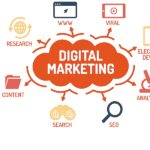In the fast-changing business world, it’s really important to get noticed and close deals to make your business grow steadily. Whether you’re just starting out or have been around for a while, being able to grab the attention of potential customers and turn interested people into loyal clients can determine whether your business does well or not. In this article, we’ll look at ways to get people interested in your business and make deals happen. These strategies are like tools that help your business grow, and we’ll call them “Grabbing Eyeballs & Business Growth” tools, which are basically strategies to make your business more successful. By using these tools, your business can move forward and become more successful
Table of Contents
Leverage the Power of Digital Marketing
In today’s digital age, online presence is paramount. Utilize various digital marketing channels such as social media, email marketing, and search engine optimization (SEO) to reach a wider audience. Craft compelling content that resonates with your target market, providing value and solving their pain points. Engaging and consistent digital marketing campaigns can help you grab the attention of potential customers and drive them toward conversion.
Build a Strong Brand Identity
A well-defined brand identity sets you apart from the competition. Invest in creating a memorable brand logo, color scheme, and messaging that reflects your company’s values and mission. When your brand consistently portrays a strong identity, it becomes easier to grab eyeballs and create a lasting impression on your audience.
Develop a User-Friendly Website
Your website serves as your digital storefront. Ensure it’s user-friendly, mobile-responsive, and optimized for speed. Provide clear and concise information about your products or services, and make the navigation process seamless. A well-designed website not only attracts visitors but also encourages them to explore and eventually make a purchase.
Content is King
Content marketing remains one of the most effective ways to engage your audience. Create informative blog posts, videos, infographics, and podcasts that educate, entertain, or inspire your target audience. Consistently delivering high-quality content establishes your expertise in your industry and keeps your audience coming back for more.
Social Proof and Testimonials
Nothing builds trust faster than positive reviews and testimonials from satisfied customers. Encourage your happy clients to leave reviews on platforms like Google My Business or Yelp. Display these testimonials prominently on your website and marketing materials to showcase your credibility and reliability.
Offer Value-Added Incentives
Incentives can be a game-changer when it comes to closing deals. Consider offering discounts, free trials, or exclusive promotions to entice potential customers. These value-added incentives can push hesitant prospects over the edge and into the conversion funnel.
Nurture Leads with Email Marketing
Email marketing is a powerful tool for nurturing leads and guiding them towards a purchase decision. Create personalized email sequences that provide relevant information and offers based on the recipient’s interests and behavior. Building a relationship through email can significantly increase your chances of closing deals.
Invest in Sales Training
Your sales team plays a crucial role in closing deals. Provide them with ongoing training to improve their communication and negotiation skills. Equip them with in-depth product knowledge and the ability to address customer objections effectively. A well-trained sales team can convert more leads into paying customers.
Monitor and Analyze Data
Use data analytics tools to track the performance of your marketing efforts and sales strategies. Analyze conversion rates, website traffic, and customer behavior to identify areas for improvement. Data-driven insights allow you to refine your approach and maximize your efforts for better results.
Adapt and Innovate
The business landscape is constantly evolving. Stay agile and open to change. Be willing to adapt your strategies and innovate to meet the changing needs and preferences of your audience. Embracing new technologies and trends can give you a competitive edge and help you stay ahead in the market.
Conclusion
In today’s fiercely competitive business landscape, mastering the art of grabbing eyeballs and closing deals is indispensable for igniting substantial business growth. Through strategic harnessing of digital marketing, cultivating a robust brand identity, curating invaluable content, and skillfully nurturing leads, you can seamlessly allure and convert customers. It is vital to maintain vigilant monitoring of your endeavors, adeptly adapting to evolving trends, and making strategic investments in enhancing your team’s capabilities. This holistic approach guarantees enduring business expansion and prosperity, fueled by the driving force of grabbing eyeballs and business growth, underpinned by the essence of Igniting Business Growth Strategies.
About Hirav Shah
Hirav Shah is an eminent Business Astrologer™ and Entrepreneur, who can help you reach new levels of success in the coming year. Shah’s unique practice mixes the fundamentals of Astrology with Business Principles, thereby introducing you to a whole new dimension of affluence.
Hirav Shah has an astounding global presence with clients based across various business sectors. He is a big believer in taking massive action, has formulated strategies and made the right strategic bets based on the certainty of outcome to help some of the world’s most renowned brands.
From business setup and expansion to crisis and exit, he can give you a strong Astro based analysis on where to apply leverage and where to cut losses.





































